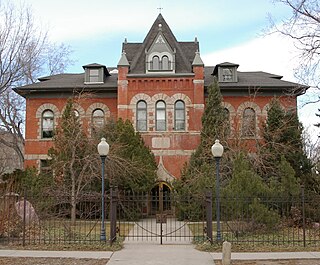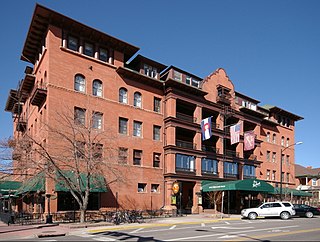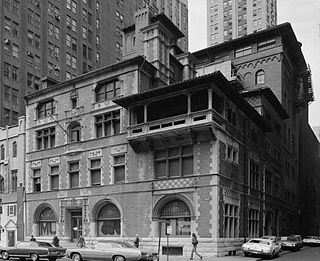
The University of Colorado Boulder is a public research university in Boulder, Colorado, United States. Founded in 1876, five months before Colorado became a state, it is the flagship university of the University of Colorado system. CU Boulder is a member of the Association of American Universities and is classified among R1: Doctoral Universities – Very high research activity.
Charles Zeller Klauder was an American architect best known for his work on university buildings and campus designs, especially his Cathedral of Learning at the University of Pittsburgh, the first educational skyscraper.

Collegiate Gothic is an architectural style subgenre of Gothic Revival architecture, popular in the late-19th and early-20th centuries for college and high school buildings in the United States and Canada, and to a certain extent Europe. A form of historicist architecture, it took its inspiration from English Tudor and Gothic buildings. It has returned in the 21st century in the form of prominent new buildings at schools and universities including Cornell, Princeton, Washington University, and Yale.

George Norlin was president of the University of Colorado. During his tenure as president, Norlin oversaw the redesign of the campus in Boulder, Colorado.

The Colorado Chautauqua, located in Boulder, Colorado, United States, and started in 1898, is the only Chautauqua west of the Mississippi River still continuing in unbroken operation since the heyday of the Chautauqua Movement in the 1920s. It is one of the few such continuously operating Chautauquas remaining in the United States, and was designated a National Historic Landmark in 2006. According to its governing body, the Colorado Chautauqua Association, it is also unique in that it is the only year-round Chautauqua.

Highland School, also or previously known as Highland-Lawn School, is an 1892 building at 9th Street and Arapahoe Avenue in Boulder, Colorado. It was the fourth school built in Boulder and was used as a school until 1971. The Highland School Building was converted to use as an office building and placed on the National Register of Historic Places in 1978. The building is constructed of red brick and blond sandstone mined from local quarries.

Jules Jacques Benois Benedict was one of the most prominent architects in Colorado history, whose works include a number of well-known landmarks and buildings listed on the National Register of Historic Places.

The Woodbury County Courthouse is located at 620 Douglas Street in Sioux City, the county seat of Woodbury County, Iowa, United States. It is regarded as "one of the finest Prairie School buildings in the United States" and has been declared a National Historic Landmark for its architecture. It is used for legal proceedings in the county.
This is an incomplete list of historic properties and districts at United States colleges and universities that are listed on the National Register of Historic Places (NRHP). This includes National Historic Landmarks (NHLs) and other National Register of Historic Places listings. It includes listings at current and former educational institutions.

The Hotel Boulderado is located at 13th and Spruce St. in downtown Boulder, Colorado. It opened its doors on New Year's Day 1909 and is considered Boulder's first luxury hotel. The original 1908 Otis Elevator is still in operation.

This is a list of the National Register of Historic Places listings in Pasadena, California.

The University of Colorado Anschutz Medical Campus is the academic health sciences campus in Aurora, Colorado that houses the University of Colorado's six health sciences-related schools and colleges, including the University of Colorado School of Medicine, the CU Skaggs School of Pharmacy and Pharmaceutical Sciences, the CU College of Nursing, the University of Colorado School of Dental Medicine, and the Colorado School of Public Health, as well as the graduate school for various fields in the biological and biomedical sciences. The campus also includes the 184-acre (0.74 km2) Fitzsimons Innovation Community, UCHealth University of Colorado Hospital, Children's Hospital Colorado, the Rocky Mountain Regional Veterans Affairs hospital, and a residential/retail town center known as 21 Fitzsimons. CU Anschutz is the largest academic health center in the Rocky Mountain region.

Frank Miles Day was a Philadelphia-based architect who specialized in residences and academic buildings.
Frederick Sterner (1862–1931) was a British-born American architect, who designed large residential and commercial buildings in Colorado and New York City. Many of his structures are listed on the National Register of Historic Places.
Ehrick Kensett Rossiter was an American architect known for the country homes he designed.

The Osgood Gamekeeper's Lodge is located along State Highway 133 near Redstone, Colorado, United States. It is a timber frame structure built at the beginning of the 20th century. In 1989 it was listed on the National Register of Historic Places.
Frederick Albert Hale was an American architect who practiced in states including Colorado, Utah, and Wyoming. According to a 1977 NRHP nomination for the Keith-O'Brien Building in Salt Lake City, "Hale worked mostly in the classical styles and seemed equally adept at Beaux-Arts Classicism, Neo-Classical Revival or Georgian Revival." He also employed Shingle and Queen Anne styles for several residential structures. A number of his works are listed on the U.S. National Register of Historic Places.
Morris Frederick Bell was an American architect known primarily for his institutional buildings but also for his domestic and commercial structures. His best known work is the David R. Francis Quadrangle the historic center of the University of Missouri including Jesse Hall. He also designed state correctional schools in Boonville, Chillicothe, and Tipton; and state mental hospitals in Fulton, Higginsville, and Nevada. Bell, a democrat, was also active in civic life, especially Masonic organizations. He trained and employed William Lincoln Garver as an assistant. Garver would later go on to have a stand-alone career.

The Boulder Post Office, also known as Boulder Main Post Office, at 1905 Fifteenth St. in Boulder, Colorado, was built in 1910. It was listed on the National Register of Historic Places at US Post Office—Boulder Main in 1986.














